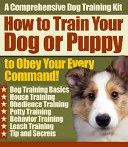Good Dog Training Advice
Get Fast & Simple Dog Training Tips to
Turn a Difficult Dog Into an Obedient Pet!
Dealing With a Dog Food Allergy?
Dogs may react to some food components resulting in an allergic reaction. Most people however do not know how to distinguish between symptoms of food allergy and food intolerance. So, how do you deal with a dog food allergy if it occurs in your household? Food allergy in most dogs will present as excessive itching on some parts of the body such as back side ears and feet. This itching will most times be accompanied by other skin lesions. Food intolerance on the other hand will mostly cause digestive upsets with the dog experiencing diarrhoea and vomiting. If you are suspecting your dog is suffering from a food allergy then prompt withdrawal of whatever food the dog is being fed may be necessary. When you are taking your dog to the vet, it is important that you have some vital information that will aid the vet in ruling out other causes of itchiness and help to narrow down the list of suspect ingredients. Other conditions that may cause itchiness may include canine atopic dermatitis. However this is easy to rule out since it will be observed in certain seasons. Food allergies on the other hand are present all year long. Most dogs will be allergic to some protein sources such as beef or chicken. This includes any by products of such meat that may be included in the diet. Some dogs also react to gluten which is present in wheat and its products. Soy is another ingredient that will cause allergies in sensitive individuals. Since these sources are major ingredients in most commercially available dog food, if your dog is prone to allergies it is wise to avoid such foods. Instead you can switch to a hypoallergenic diet, in this type of diet; the dog is fed on food that contains very little ingredients. With time, ingredients are added to the food with some time being given after the addition of an ingredient in order to study if there’s any reaction. If an ingredient added to a hypoallergenic diet produces a reaction then it is the “offender.” By knowing the offender, then you know what to avoid when purchasing dog food or when feeding your dog homemade meals. Diagnosis of food allergies is by conducting food trials. These trials are conducted over a 12 week period during which the dog is fed on rare meat and carbohydrate sources such as lamb or rabbit meat as protein sources and rice or potato as carbohydrate sources. During the trial period, the dog shouldn’t be fed on anything else but the specific chosen food and water. All treats, chews and oral medication are withheld in the trial period. If within these few weeks or days of the special diet, there is a reduction in symptoms, then it is likely that you are dealing with a food allergy. Treatment of dog food allergies is by withdrawal of the offending substance. If this substance is not known, then the dog should be switched to a hypoallergenic diet till the symptoms are better. The itchiness may be relieved through use of steroids and antihistamines. You can feed your dog a homemade diet. Some people may prefer this since it is easy to keep track of the ingredients used. Make sure that the diet is balanced and nutritious for your dog. Just a reminder, make sure you check out the free dog life saving video below, you'll be so glad that you did: | |
|


Discover the Secrets to Training Your Dog Or Puppy. Huge BONUSES for a limited time only!
Click here now...
|
http://GoodDogTrainingAdvice.com





